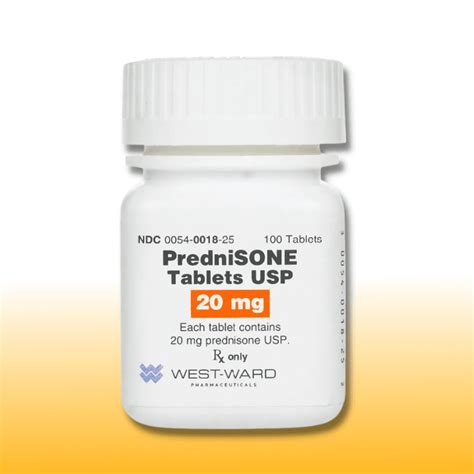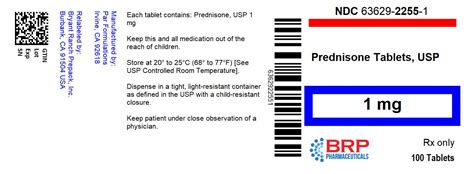Intro
Prednisone is a synthetic corticosteroid that has been widely used in the medical field for its potent anti-inflammatory and immunosuppressive properties. It is a synthetic version of the naturally occurring steroid hormone cortisol, which is produced by the adrenal gland. Prednisone is commonly prescribed to treat a variety of conditions, including inflammatory diseases, autoimmune disorders, and certain types of cancer. Its ability to reduce inflammation and suppress the immune system makes it an effective treatment option for many patients.
The importance of prednisone lies in its ability to mimic the effects of cortisol, a hormone that plays a crucial role in the body's response to stress, injury, and infection. Cortisol helps to regulate the immune system, reduce inflammation, and maintain blood sugar levels. However, in some cases, the body may not produce enough cortisol, or the immune system may become overactive, leading to a range of health problems. This is where prednisone comes in – it helps to supplement the body's natural cortisol production, reducing inflammation and suppressing the immune system to prevent further damage.
Prednisone has been used to treat a wide range of conditions, including asthma, rheumatoid arthritis, lupus, and certain types of cancer. It is also used to prevent organ rejection in transplant patients and to treat inflammatory bowel disease. The medication works by binding to specific receptors in the body, which helps to reduce inflammation and suppress the immune system. This can help to alleviate symptoms such as pain, swelling, and redness, and can also help to prevent long-term damage to the body's tissues and organs.
How Prednisone Works

Prednisone works by binding to specific receptors in the body, known as glucocorticoid receptors. These receptors are found in various tissues, including the skin, lungs, and joints. When prednisone binds to these receptors, it triggers a range of effects that help to reduce inflammation and suppress the immune system. This includes the production of anti-inflammatory proteins, the reduction of pro-inflammatory cytokines, and the suppression of immune cell activity.
The exact mechanism of action of prednisone is complex and involves multiple pathways. However, the overall effect is to reduce inflammation and prevent tissue damage. This can help to alleviate symptoms such as pain, swelling, and redness, and can also help to prevent long-term damage to the body's tissues and organs.
Benefits of Prednisone
The benefits of prednisone are numerous and well-documented. Some of the most significant benefits include: * Reduced inflammation: Prednisone is highly effective at reducing inflammation, which can help to alleviate symptoms such as pain, swelling, and redness. * Suppressed immune system: Prednisone can help to suppress the immune system, which can help to prevent autoimmune disorders and reduce the risk of organ rejection in transplant patients. * Improved symptoms: Prednisone can help to improve symptoms such as fatigue, fever, and weight loss, which are common in patients with inflammatory diseases. * Increased quality of life: By reducing inflammation and suppressing the immune system, prednisone can help to improve quality of life for patients with chronic diseases.Side Effects of Prednisone

While prednisone is an effective treatment option for many conditions, it can also cause a range of side effects. Some of the most common side effects include:
- Weight gain: Prednisone can cause weight gain, particularly in the face, neck, and trunk.
- Mood changes: Prednisone can cause mood changes, such as anxiety, depression, and irritability.
- Insomnia: Prednisone can cause insomnia and other sleep disturbances.
- Increased appetite: Prednisone can increase appetite, leading to weight gain and other metabolic problems.
- Skin changes: Prednisone can cause skin changes, such as thinning, bruising, and poor wound healing.
Long-Term Effects of Prednisone
The long-term effects of prednisone can be significant and may include: * Osteoporosis: Prednisone can cause osteoporosis, particularly in older adults. * Cataracts: Prednisone can cause cataracts, particularly in patients who take high doses for extended periods. * Glaucoma: Prednisone can cause glaucoma, particularly in patients who take high doses for extended periods. * Adrenal insufficiency: Prednisone can cause adrenal insufficiency, particularly in patients who take high doses for extended periods.Precautions and Interactions

Prednisone can interact with a range of medications, including:
- Blood thinners: Prednisone can increase the risk of bleeding when taken with blood thinners.
- Diabetes medications: Prednisone can increase blood sugar levels, which can interact with diabetes medications.
- Blood pressure medications: Prednisone can increase blood pressure, which can interact with blood pressure medications.
- Vaccines: Prednisone can reduce the effectiveness of vaccines, particularly live vaccines.
Patients taking prednisone should also be aware of the following precautions:
- Do not stop taking prednisone suddenly, as this can cause withdrawal symptoms.
- Do not take prednisone with grapefruit or grapefruit juice, as this can increase the risk of side effects.
- Do not take prednisone with certain antibiotics, as this can increase the risk of side effects.
Dosage and Administration
The dosage and administration of prednisone will depend on the specific condition being treated and the individual patient's needs. Typical dosages range from 5-60 mg per day, taken orally or intravenously. Patients should always follow the instructions of their healthcare provider and take prednisone exactly as directed.Alternatives to Prednisone

For patients who are unable to take prednisone or who experience significant side effects, there are several alternative treatment options available. These may include:
- Other corticosteroids: Other corticosteroids, such as hydrocortisone or methylprednisolone, may be used as alternatives to prednisone.
- Non-steroidal anti-inflammatory drugs (NSAIDs): NSAIDs, such as ibuprofen or naproxen, may be used to reduce inflammation and alleviate symptoms.
- Biologic agents: Biologic agents, such as etanercept or adalimumab, may be used to treat autoimmune disorders and reduce inflammation.
- Lifestyle modifications: Lifestyle modifications, such as diet and exercise changes, may be used to reduce inflammation and alleviate symptoms.
Conclusion and Future Directions
In conclusion, prednisone is a highly effective treatment option for a range of conditions, including inflammatory diseases, autoimmune disorders, and certain types of cancer. While it can cause a range of side effects, the benefits of prednisone often outweigh the risks. As research continues to advance, new alternatives to prednisone may become available, offering patients more treatment options and improved outcomes.What is prednisone used for?
+Prednisone is used to treat a range of conditions, including inflammatory diseases, autoimmune disorders, and certain types of cancer.
What are the side effects of prednisone?
+The side effects of prednisone can include weight gain, mood changes, insomnia, increased appetite, and skin changes.
How long does it take for prednisone to work?
+The effects of prednisone can be seen within a few days to a week, depending on the specific condition being treated and the individual patient's response.
Can I stop taking prednisone suddenly?
+No, patients should not stop taking prednisone suddenly, as this can cause withdrawal symptoms. Instead, patients should gradually taper off the medication under the guidance of their healthcare provider.
Are there any alternatives to prednisone?
+Yes, there are several alternatives to prednisone, including other corticosteroids, non-steroidal anti-inflammatory drugs (NSAIDs), biologic agents, and lifestyle modifications.
We hope this article has provided you with a comprehensive understanding of prednisone, its uses, benefits, and side effects. If you have any further questions or would like to share your experiences with prednisone, please comment below. Additionally, if you found this article informative, please share it with others who may benefit from this information.
